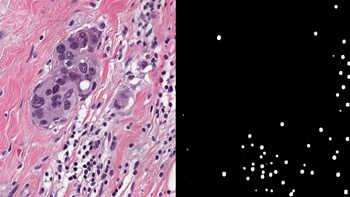Awards totaling $400,000 to fund cancer detection AI, COVID-19 drug research

Credit: SwRI
SAN ANTONIO — March 31, 2021 — Collaborative teams that include Southwest Research Institute staff received two of six recently awarded San Antonio Medical Foundation (SAMF) bioscience grants. SwRI, in collaboration with UT Health San Antonio and University Health System, received a nearly $200,000 grant to develop machine learning algorithms for cancer detection. A team from SwRI, UT Health San Antonio, The University of Texas at San Antonio and Texas Biomedical Research Institute also received a grant of nearly $200,000 for its work to identify drug molecules that interfere with the entry of SARS-CoV-2, the virus that causes COVID-19, into human cells.
The team developing cancer detection algorithms is using artificial intelligence to improve the speed and accuracy of cancer diagnosis and treatment, leading to better outcomes for patients. Artificial intelligence (AI) is the training of computers to recognize patterns and make predictions.
Researchers will focus on follicular lymphoma, a type of non-Hodgkin lymphoma, and Philadelphia chromosome-negative myeloproliferative neoplasms, malignancies caused by mutated bone marrow stem cells. They are training an algorithm to quantify immune cells and proteins expressed by these cancer cells, eliminating the guesswork for pathologists and providing information about tumor characteristics to guide treatment.
“AI can improve diagnosis and prognosis by analyzing patterns that may be overlooked or not easily visible to the pathologist,” said Hakima Ibaroudene, an engineer and program manager in SwRI’s Intelligent Systems Division and a member of the three-person research team. “It allows a deeper analysis of statistics across sets of images and more precisely quantifies cells and their attributes. The ultimate goal is to give the patient the best chance for successful treatment.”
Dr. Jonathan Bohmann, a staff scientist in SwRI’s Chemistry and Chemical Engineering Division, jointly leads a team identifying drug compounds that thwart SARS-CoV-2. The highly infectious virus spreads by entering host cells.
Their research aims to prevent the virus from breaching human cells. The team is identifying drug molecules that interrupt the binding action between a virus protein and host cells. They are using SwRI’s Rhodium™ virtual screening software to survey 2 million drug compounds to pinpoint effective therapies to prevent infection.
“I am eager to be a part of this critical collaboration to identify drug molecules that interrupt the virus’ attack on human cells,” Bohmann said. “The goal of this research is to develop sets of candidate drug compounds that stop the virus’ entry process. The SAMF funding allows us to focus on this piece of the puzzle and gather vital data, which will move us into safety testing, the next phase of study. Through this work, we envision developing an effective, safe COVID-19 treatment.”
The nonprofit San Antonio Medical Foundation awarded six grants in its latest round of funding, totaling more than $1 million. The winners were chosen from a pool of 44 applicants. Grant proposals were selected based on collaborative effort, how well the projects leverage the strengths of each institution and whether the work will raise the national and international research profile of the San Antonio bioscience community.
“The primary purpose of our grants is to promote collaboration among health care and bioscience research institutions,” said Jim Reed, president of the foundation. “These applications not only met that criteria, but each project will further scientific discovery in urgent areas of medical research.”
###
To learn more about machine learning for cancer detection, visit https:/
To learn more about Rhodium virtual screening software, visit https:/
Release url: https:/
Client service link: https:/
Second client service link: https:/
Media Contact
Lisa M. Pena
[email protected]
Original Source
https:/




